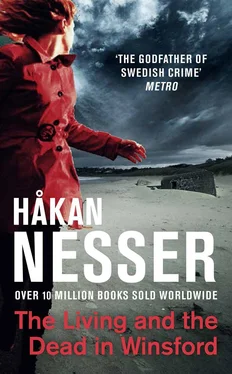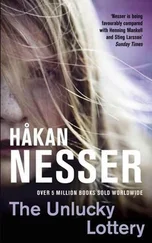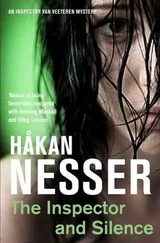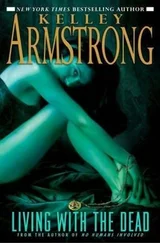Håkan Nesser - The Living and the Dead in Winsford
Здесь есть возможность читать онлайн «Håkan Nesser - The Living and the Dead in Winsford» весь текст электронной книги совершенно бесплатно (целиком полную версию без сокращений). В некоторых случаях можно слушать аудио, скачать через торрент в формате fb2 и присутствует краткое содержание. Год выпуска: 2013, Издательство: Mantle, Жанр: Криминальный детектив, на английском языке. Описание произведения, (предисловие) а так же отзывы посетителей доступны на портале библиотеки ЛибКат.
- Название:The Living and the Dead in Winsford
- Автор:
- Издательство:Mantle
- Жанр:
- Год:2013
- ISBN:нет данных
- Рейтинг книги:4 / 5. Голосов: 1
-
Избранное:Добавить в избранное
- Отзывы:
-
Ваша оценка:
- 80
- 1
- 2
- 3
- 4
- 5
The Living and the Dead in Winsford: краткое содержание, описание и аннотация
Предлагаем к чтению аннотацию, описание, краткое содержание или предисловие (зависит от того, что написал сам автор книги «The Living and the Dead in Winsford»). Если вы не нашли необходимую информацию о книге — напишите в комментариях, мы постараемся отыскать её.
The Living and the Dead in Winsford — читать онлайн бесплатно полную книгу (весь текст) целиком
Ниже представлен текст книги, разбитый по страницам. Система сохранения места последней прочитанной страницы, позволяет с удобством читать онлайн бесплатно книгу «The Living and the Dead in Winsford», без необходимости каждый раз заново искать на чём Вы остановились. Поставьте закладку, и сможете в любой момент перейти на страницу, на которой закончили чтение.
Интервал:
Закладка:
Håkan Nesser
The Living and the Dead in Winsford
‘Characteristic of the moor is that to all intents and purposes, it has no beginning and no end. I would like to mention three other things that are not to be found in this sublime landscape: cul-de-sacs, evasive excuses, and last but not least — words.’
Royston Jenkins (1866–1953), innkeeper in Culbone‘. . the dispassionate fluids of an eye that tried so hard to forget one particular thing that it ended up forgetting everything else.’
Roberto Bolaño, AmuletONE
1
The day before yesterday I decided that I would outlive my dog. I owe him that. Two days later, in other words today, I decided to drink a glass of red wine in Wheddon Cross.
That is how I intend to pass the time from now on. Make decisions, and stick to them. It’s not all that difficult, but harder than it sounds, and, of course, everything depends on the circumstances.
The rain had followed me all the way across the moor, ever since I turned off the A358 at Bishops Lydeard, and as dusk set in quickly it made tears well up in my eyes like cold lava. A falling movement, then a rising one; but those tears that were forming were perhaps a good sign. I have wept too seldom in my life — I’ll come back to that.
I had set off from London at about one, and after I had wriggled my way out through Notting Hill and Hammersmith the journey had exceeded my expectations. Driving westwards along the M4, through Hampshire, Gloucestershire and Wiltshire — at least, that’s what I think the counties are called — and a few hours later southwards along the M5 after Bristol. It feels reassuring that all these roads have a number — and all the places a name — but the fact that it feels like that is less reassuring.
Exceeded my expectations may well also be the wrong expression to use in the context, but my apprehensions about getting lost, taking the wrong turning and ending up in endless traffic jams on the motorway heading in the wrong direction, and not arriving on time, had kept me awake for a large part of the night. The rest of the night it was the old story about Martin’s sister’s lover that kept me going. I don’t know why he and she turned up in my thoughts, but they did. One is so defenceless in the early hours of the morning.
I’m not used to driving, thanks to the way things turned out. I remember that when I was young I used to think that it gave me a sense of freedom, sitting behind the wheel and being master — or rather mistress — of my fate and the routes I chose. But it has been Martin who has done all the driving for the last fifteen or twenty years: it’s a long time since we even raised the question of who was going to sit in the driving seat when we went on our joint car trips. And he has always turned his nose up at anything to do with GPS.
There are such things as maps, aren’t there? What’s wrong with good old maps all of a sudden?
And then of course there was the problem of driving on the left in this stubborn old country, so the risk of something going haywire at any moment was quite considerable. But I managed it. I had overcome both the minefield of London’s obsolete traffic systems and the torture presented by the motorways. I had succeeded in filling up with petrol and paying cash without any problems, and it was only when I got as far as the narrow roller-coaster of roads over Exmoor that the feeling of melancholy caught up with me. But I never stopped in a lay-by in order to raise my depressed spirits, even though I maybe ought to have done. Besides, I’m not at all sure that I saw a lay-by.
But as the fact is that in this country nearly every place named on a map also has a pub, at shortly after half past four I parked next to a white van with the text ‘Peter’s Plumbing’ on the door in a strikingly deserted car park next to a strikingly abandoned cricket field. I hurried indoors without giving myself time for remorse or second thoughts.
So, Wheddon Cross it was. I had never set foot here before, and had never heard of it.
Well, I did wonder for just a moment whether I ought to take Castor for a little walk first, before drinking that glass of wine — I must admit that I did. But he doesn’t like rain, and he had been out when we stopped for petrol an hour and a half ago. I don’t think he even raised his head when I opened and closed the car door. He enjoys having a rest, Castor does — he sometimes sleeps fifteen or sixteen hours a day if he gets the chance.
The place turned out to be called The Rest and Be Thankful Inn. Apart from the big-busted bleach-blonded woman behind the bar (about my own age, possibly slightly younger in fact), there were only two other living beings in sight that late November afternoon: a frail-looking old lady with a crossword puzzle, drinking tea, and an overweight man in his thirties wearing working-clothes and a dirty baseball cap with a fancy-looking PP just above the peak, with a mug of beer firmly grasped in his powerful hand. I assumed he must be the peripatetic plumber, but neither he nor the crossword-woman looked up when I entered the room.
But Bar-Blondie did so. Mind you, she did so only after first carefully drying the wine glass she had in her hand and placing it on a shelf in front of her, but still.
I ordered a glass of red, she asked if Merlot would be okay, and I said that would be absolutely splendid.
‘Large or small?’
‘Large, please.’
It’s possible that PP and the crossword puzzle solver raised various eyebrows, but if so it was something I registered in the same way that one notices a butterfly behind one’s back.
‘It’s raining,’ said Blondie as she poured out the wine.
‘Yes,’ I replied. ‘It certainly is.’
‘Rain, rain, rain.’
She said that in a singing tone of voice, and I assumed it must be the refrain in some hit or other. I don’t know why I chose the word ‘hit’ — I’m only fifty-five after all. But there are certain words and phrases that my father used to use, and I’ve noticed that lately I’ve started using them as well. Top hole. Cuppa char. Brolly.
I took my glass and sat down at a table where there was a little brochure featuring local walks. I pretended to begin studying it, in order to have something to do with my eyes. What I would really have liked to do was to drink my wine in three deep swigs and then carry on driving; but it was not my intention to make a lasting impression on those present. I might eventually return — even though my reason for stopping at just this place was that I hoped never to return there. A solitary, unknown woman of mature years who pops in and drinks a large glass of wine in the afternoon would no doubt attract attention in a small village. That’s the way it is, nothing to get het up about unless you are a poet or an artist. I’m not a poet or an artist.
And Wheddon Cross was not my village. My village is called Winsford, and according to the brochure on the table in front of me it is half a dozen miles to the south. The pub there is where I really must be careful not to put a foot wrong. That is where I am likely to become a regular customer, and exchange a few words and thoughts with my neighbour. That was in any case the way I had approached the situation, and after the first sip of wine I was pleased to note that the lava-like tears had subsided. There is a sumptuous, velvety quality about red wine that could turn me into an alcoholic, but that is not the path I intend to follow.
In fact I have very vague ideas about the paths I ought to be following. That’s the way I have developed, and what things are going to look like in six months’ time is a matter of almost laughable unpredictability. As the Bible says, sufficient unto the day is the evil thereof.
Читать дальшеИнтервал:
Закладка:
Похожие книги на «The Living and the Dead in Winsford»
Представляем Вашему вниманию похожие книги на «The Living and the Dead in Winsford» списком для выбора. Мы отобрали схожую по названию и смыслу литературу в надежде предоставить читателям больше вариантов отыскать новые, интересные, ещё непрочитанные произведения.
Обсуждение, отзывы о книге «The Living and the Dead in Winsford» и просто собственные мнения читателей. Оставьте ваши комментарии, напишите, что Вы думаете о произведении, его смысле или главных героях. Укажите что конкретно понравилось, а что нет, и почему Вы так считаете.












